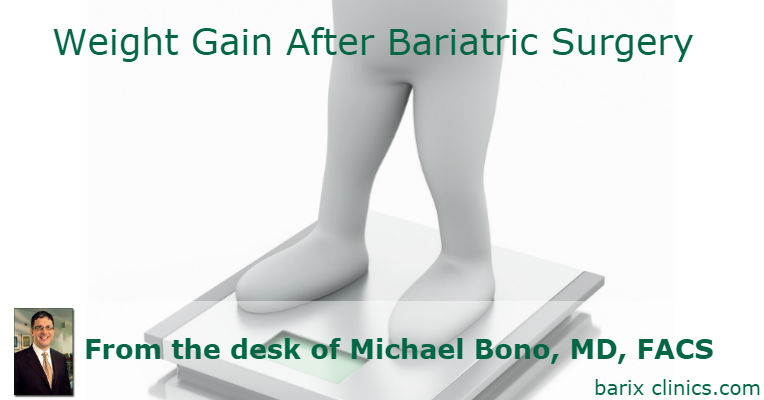Weight Gain after Bariatric Surgery
A common question is what if I regain my weight after surgery? Can I stretch my pouch? What if the procedure “fails”?
Morbid obesity is a severe, chronic disease, and requires a lifetime of treatment and follow-up, not unlike other chronic diseases such as peripheral vascular disease, coronary artery disease, or degenerative joint disease. All of these disease processes may require further medical or surgical intervention, which is an acceptable concept when dealing with any chronic disease, just like morbid obesity.
Bariatric surgery is extremely effective, and most patients respond well to initial therapy. Some patients partially respond, and a very small percentage do not respond. In my opinion, a less than optimal result after bariatric surgery is not a “failure” — there are many concepts and treatments to remedy this issue for improved results.
It is a misconception that most bariatric patients regain their weight. It is true that approximately 50% of patients may regain a small amount of weight after surgery, but this amount is less than 5%, and occurs usually two years after procedure. The majority of studies prove that surgery is the only long term viable weight loss strategy for those people who are morbidly obese, and these successful results can last over 15 years.
It is important to maintain relationship with your bariatric team after surgery; the issue of weight gain can be addressed more acutely. Many variables are involved with the evaluation of the bariatric patient with weight gain, for instance, duration since procedure, amount of weight gain, symptoms (hunger, pain), and personal circumstances (injury, illness, stress).
The weight gain evaluation falls into three categories:
- The weight gain may be acceptable with no issue with one’s original procedure, and need some medical fine tuning such as diet adjustment, addition of exercise, or change in medications or lifestyle.
- Some patients may have a mechanical issue with their original procedure that needs surgical remedy, called a corrective or revision surgery.
- Finally, the original procedure may be functioning properly, but not able to maintain proper weight maintenance, and/or causing a detrimental side affect (iron deficiency, ulcer) requiring surgical remedy, called a conversion surgery.
The good news is research shows that only 6% of bariatric patients undergo re-operative therapy, with low complication rate, and excellent outcomes…that means over 90% of patients do not require secondary surgery. The weight gain evaluation needs to be a thorough, detailed global assessment of your overall situation, an evaluation we specialize in here at Barix Clinics.


